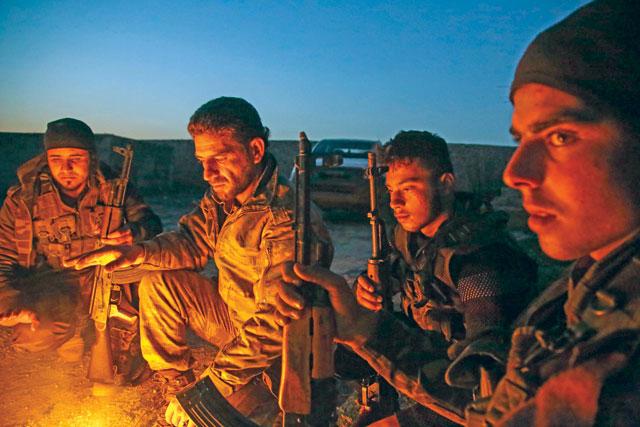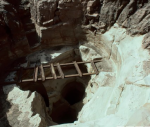You are here
With Daesh gone, East Mosul residents face uncertain future
By Reuters - Feb 01,2017 - Last updated at Feb 01,2017

A displaced Iraqi woman, who fled the violence around the northern Iraqi city of Mosul, sits inside a trolley as she waits to receive food aid at the Al Khazer refugee camp some 40 kilometres east of Arbil, on Tuesday (AFP photo)
MOSUL — When the Daesh extremist group militants swept into Mosul in 2014, they wandered into Manaf Younes' billiards hall and declared it un-Islamic, taking away his billiard balls with a stern warning.
A hall that was often packed with players until midnight was suddenly abandoned. Photographs of awards that made Younes proud gathered dust for two years and the billiard tables remained covered up.
Iraqi government forces have now pushed the militants out of East Mosul and are poised to attack the west. While Younes is thrilled, like many other small businessmen in the city, his joy is tempered by uncertainty as he tries to revive his former life.
Daesh imposed a radical version of Islam in Mosul after establishing the country's second biggest city as its de facto capital: banning cigarettes, televisions and radios, and forcing men to grow beards and women to cover from head to toe.
"I am broke. I had to sell my two cars to survive. Now my landlord is demanding two years of back rent," said Younes, picking up a trophy that reminded him of the old days.
He frowned at explosions in the distance, where Iraqi forces and extremists are exchanging fire along the Tigris River that bisects the sprawling metropolis, once a trade hub and centre for higher learning.
"These explosions hurt the business. They shake the billiard tables and make them imbalanced," he said.
The fighting has already caused widespread destruction.
US-led air strikes have demolished scores of buildings and left huge craters that destroyed roads. Rooftops have collapsed into the bottom floors. Other buildings have gaping holes from rockets or machinegun fire.
Mortar bombs still land in the city and gunfire is heard.
Across from Younes’ billiard hall stands what’s left of Mosul University, once one of the finest education institutions in the Middle East.
Daesh sold the university’s ancient manuscripts and imposed its own form of education, banning philosophy books. When the army arrived, the extremists burned down many of its buildings, leaving piles of ashes.
A few pages of textbooks on hematology and diffusion were scattered on floors cluttered with debris. Upstairs in the cafeteria were blackened tables and chairs, below huge holes from air strikes.
A few bakers and restaurant owners in the neighbourhood stood mostly idle.
They too recalled hardships under Daesh rule.
The militants and their wives would show up clutching AK-47 assault rifles and jump to the front of queues, demanding discounts, they said.
One restaurant owner, Qusay Ahmed, said he was dragged away to a Daesh jail and tortured for four months after militants accused him of stealing.
“They ripped my toenails off with pliers,” he said.
The torturers may be gone, but there are new challenges.
He and other restaurant owners have no potable water and scarce electricity, and hardly any customers.
Related Articles
MOSUL, Iraq — Even before the Daesh terror group took over her home city of Mosul, Iraqi 31-year-old Nesrine never imagined she would have a
MOSUL — Business is booming for Mosul car repair shop owner Khaled Younes, a sign of the havoc wreaked on the Iraqi city that has become the
BEIRUT — Kurdish-led fighters overran the last village held by the Daesh group in Syria on Wednesday, confining its once vast cross-border "
















